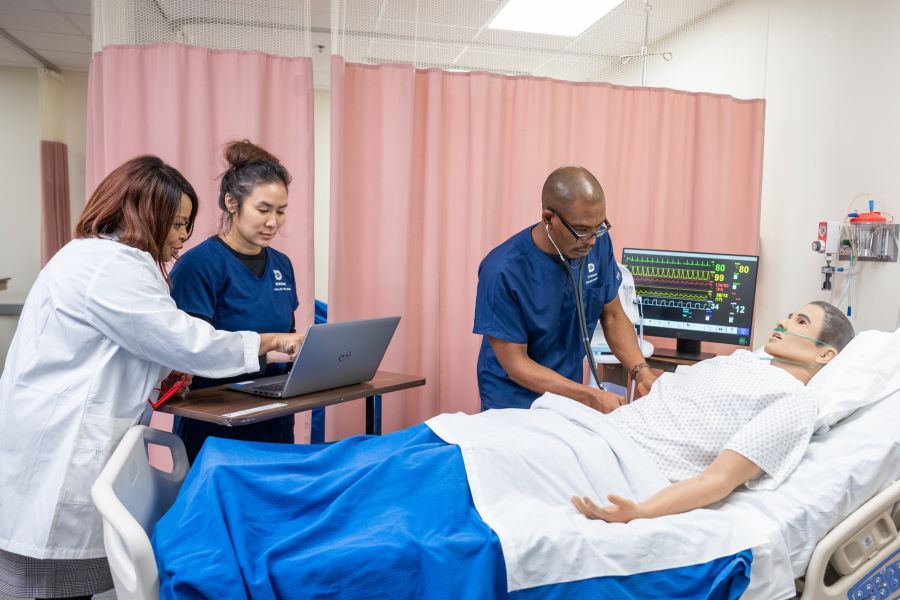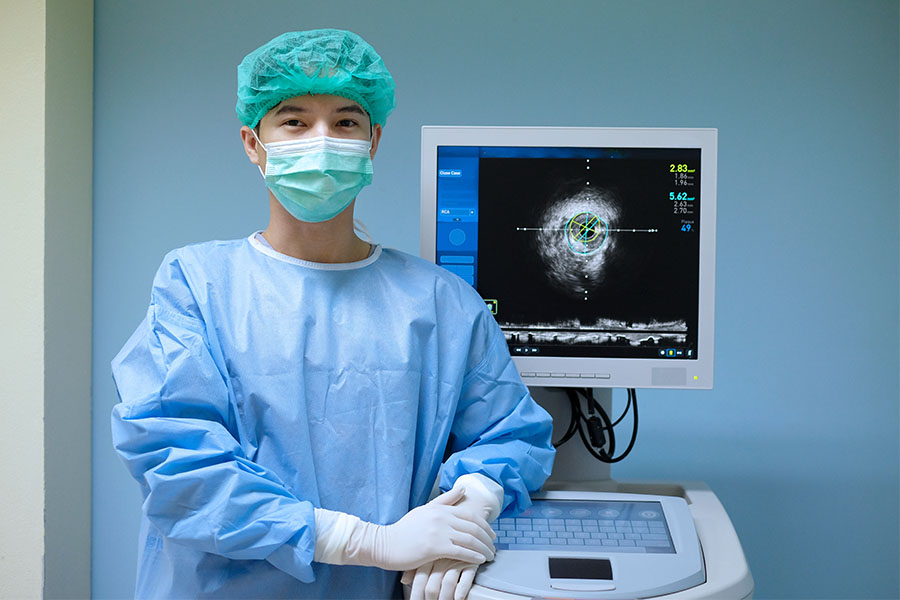Are you interested in a rewarding, fast-paced career where you can make a real difference in people’s lives? The EMS program at Dallas College offers hands-on training that prepares you for the realities of working in emergency medicine.
With certification programs for both Emergency Medical Technician (EMT) and Paramedic, Dallas College gives you the skills to enter the field and the opportunity to advance your career.
Emergency Medical Services (EMS) at a Glance
4-8 months to complete1
$891-$4,158 tuition2
- Brookhaven
- Cedar Valley
- Richland3
2 years to complete1
$5,940 tuition2
- Brookhaven
- Cedar Valley3
What Can I Study?
I Want to Go to Work
Dallas College offers fast, flexible credentials designed with local employers to help you quickly start or advance your career.
-
Credit Certificates
- Credential for Critical Care Professionals Enhanced Skills Certificate $891 4 months
- Emergency Medical Technician Basic Certificate $1,782 4 months
- Paramedic Certificate $4,158 8 months
Length of time is based on catalog degree plans1. Tuition rates are based on program hours for Dallas County residents2.
Can I Get a Job?
Dallas College offers a variety of certificates and degrees to help you gain the skills you need to start working right away.
- These credentials are often considered Career and Technical Education (CTE).
- These credentials are established with the assistance and cooperation of representatives from local business, to meet local and regional employment needs.
- Higher level certificates and degrees will typically lead to a higher salary in the workforce.
- Workforce (CE) Certificates can often be completed faster than traditional credit certificates but typically do not offer college credit.
- Level 1, Level 2, Enhanced Skills certificates and others, offer college credit and are often stackable to help you build skills as you work towards an Associate Degree.
- Workforce credentials may give you college credit at Dallas College, but they may not transfer to other colleges or universities.
If you're unsure if this is the right path for you, you can talk to a Pathway Specialist for advice.
Pathway Specialist
- 972-669-6400
- AskSOHS@DallasCollege.edu
What Can I Earn? Will There Be Plenty of Jobs?
As our population ages, demand is increasing for first responders trained to help people in medical emergencies. Check out a few of the incredible career opportunities you’ll be ready for. Your future starts here!

Ambulance Drivers and Attendants
$15/hr
Median Salary
27
Job Openings
+11%
Projected Outlook
Top Skills:
- Service Orientation
- Critical Thinking
- Active Listening
- Reading Comprehension
- Social Perceptiveness
- Speaking
- Active Learning
- Instructing
- Operation and Control
- Monitoring

Medical and Health Services Managers
$53/hr
Median Salary
1984
Job Openings
+31%
Projected Outlook
Top Skills:
- Critical Thinking
- Speaking
- Reading Comprehension
- Management of Personnel Resources
- Monitoring
- Active Listening
- Judgment and Decision Making
- Time Management
- Writing
- Social Perceptiveness

Paramedics
$28/hr
Median Salary
133
Job Openings
+14%
Projected Outlook

Police, Fire, and Ambulance Dispatchers
$26/hr
Median Salary
249
Job Openings
+12%
Projected Outlook
Top Skills:
- Active Listening
- Speaking
- Social Perceptiveness
- Critical Thinking
- Coordination
- Service Orientation
- Reading Comprehension
- Judgment and Decision Making
- Complex Problem Solving
- Monitoring
All jobs data gathered for Dallas/Fort Worth. Source: Dallas College Labor Market Intelligence and Lightcast4.
“The best part of the program was the size of the classes; they really take care to keep the student-instructor ratio low. Our instructors were always very approachable so that if we had questions, issues or problems, there was always someone you could find and ask.” Read Meredith Rima Garee, LP's story.

A Look Inside Emergency Medical Services
Are you interested in a rewarding and fast-paced job in the medical field where you can make a difference in people's lives? The EMT and Paramedic Programs at Dallas College will prepare you for the reality of your future career. There are two levels in the emergency medical services program: Emergency Medical Technician-Basic and Paramedic.
The Emergency Medical Technician provides basic life support and emergency health care in settings such as ambulance agencies, hospitals, and fire departments. The Paramedic program is designed to prepare you to provide advanced pre-hospital emergency care, such as intravenous fluids and medications, endotracheal intubation and electrocardiogram rhythm identification and treatment.
The Emergency Medical Services Programs provides classroom instruction, access to cutting edge technology, ambulance experience, and hospital rotations with an emphasis on emergency department experience.
To learn more, visit our website and begin your Dallas College experience.
Emergency Medical Services (EMS) careers typically have two main certification levels: Emergency Medical Technician (EMT) and Paramedic. Dallas College provides certification training for both.
EMT is the most common certification and is a starting point for a rewarding career in the health care field. The EMT training at Brookhaven, Cedar Valley or Richland will teach you to provide basic life support and emergency health care in settings such as ambulance agencies, hospitals and fire departments.
Becoming a Paramedic requires that you have a current EMT certification and successfully complete EMSP 2471, an anatomy and physiology course. The Paramedic program, offered at Brookhaven or Cedar Valley, is a 34-credit-hour program that prepares you to provide advanced health care to patients. Students can also complete the AAS-Paramedic degree plan. We offer Paramedic classes year-round in full-time, shift-based and hybrid formats.
Labs and equipment include cutting-edge technology similar to what you will find in the workplace. Clinical rotations are conducted at area hospitals for completion of the program. Internships are conducted with local emergency services providers and fire departments.
Learn about each program's requirements, eligibility, schedules and more.
Apply to the EMT Program
Enrollment in the EMT program is restricted. To register, contact Amy Smith Carman.
You must submit copies of the following documents to register (can be emailed as PDF files):
- State-issued photo ID or driver's license
- Verification of medical insurance
- BLS-CPR current course completion from American Heart Association
- Physical (simple school sports type OK, no specific form or format needed) done within six months of program start.
- Immunization records
- Records are reviewed by program staff. Upon approval, students will submit records to SurScan.
If you are using financial aid to pay for the EMT program, your aid must be awarded and accessible before the first day of class. Please contact the Financial Aid Office with further questions.
Apply to the Paramedic Program
Applications are accepted on a first-come, first-served basis. Contact Amy Smith Carman to submit required documents (below) and complete registration.
Texas DSHS EMT Credential (NREMT can be used for conditional admission)
Applicants to the Paramedic program must have completed previous training as an Emergency Medical Technician (EMT) and have a current and valid state of Texas EMT certification. National Registry credential can be used for conditional admission pending completion of the Texas state certification.
Anatomy and Physiology (A&P)
Students must take EMSP 2471 as the first course of the Paramedic cohort sequence. This is the only approved anatomy and physiology course for the EMT and paramedic programs.
Other Requirements
- Graduation from high school or successful completion of the General Education Development (GED) test.
- Application and current admission to Dallas College.
- Submission of official transcripts from each college or university previously attended (transcripts from the campuses of Dallas College are not required).
- Submission of copies of the following documents to EMS office (in person or by email as PDF files):
- State-issued photo ID or driver's license
- Verification of medical insurance
- BLS-CPR current course completion from American Heart Association or American Red Cross
- Physical exam (simple school sports type OK, no specific form or format needed) done within six months prior to program start
- Immunization records including titers for Hep-B, MMR and varicella. A recent TB skin test is also required.
- Current and valid state of Texas EMT certification
Paramedic Program
The Dallas College Paramedic program is accredited by the Commission on Accreditation of Allied Health Education Programs, upon the recommendation of the Committee on Accreditation of Educational Programs for the Emergency Medical Services Professions (CoAEMSP).
Commission on Accreditation of Allied Health Education Programs
727-210-2350
www.caahep.org
To Contact CoAEMSP:
214-703-8445
www.coaemsp.org
Paramedic Program
The goal of the Paramedic program is to prepare paramedics who are competent in the cognitive (knowledge), psychomotor (skills), and affective (behavior) learning domains to enter the profession.
Brookhaven Campus
- Based on 2023 results, the success rate for the National Registry of EMT Paramedic Cognitive exam was 91%.
- The most recent positive placement* rate for 2023 graduates was 96%.
- For cohorts that completed programs in 2023, the retention rate was 91%.
Cedar Valley Campus
- Based on 2023 results, the success rate for the National Registry of EMT Paramedic Cognitive exam was 100%.
- The most recent positive placement* rate for 2023 graduates was 92%.
- For cohorts that completed programs in 2023, the retention rate was 95%.
About the Program
The Emergency Medical Technician (EMT) certificate is an entry-level certificate that will train you to provide basic life support and emergency health care in settings such as an ambulance agencies, hospitals and fire departments. EMT is the most common certification and is a starting point for a rewarding career in the health care field. The EMT training at Brookhaven, Cedar Valley or Richland campuses will teach you to provide basic life support and emergency health care in settings such as ambulance agencies, hospitals and fire departments.
The EMT certificate program includes classroom and laboratory instruction, emergency ambulance experience and hospital rotations with an emphasis on emergency department experience. You will receive instruction in basic life support, such as cardiopulmonary resuscitation, automatic external defibrillator use, patient physical assessment, bandaging and splinting, traction splinting, spinal immobilization, airway management, medication administration, oxygen therapy and other noninvasive procedures.
The EMT certification program requires 272 training hours that consist of hospital rotations, classroom instruction, lab practice and internships in an ambulance. After the training, successful candidates must take a national exam called the National Registry of Emergency Medical Technicians.
Class Schedules
We offer training classes year-round, so review our class schedule to find a training class that works for you. Dallas College offers several course formats to help meet the needs of all of our students (availability of formats varies): In person, hybrid, evenings and weekdays.
EMT classes are offered in cohorts, where a group of students go through the entire program together. Once students choose a cohort, they will continue with that cohort and in that format for the remainder of the program.
Cost of Training
Not including tuition, here are the average out-of-pocket costs you can expect to pay in throughout EMT program. Prices are subject to change and are approximations.
- Uniform: $22-$26
- SurScan account: $15 for document tracking (background and drug screening are separate)
- Drug screening: $42 via SurScan
- Criminal background check: $45 via SurScan
- Fingerprinting (approximate cost): $50
- Texas criminal background check: $45
- The SurScan background check is only for program use. The State of Texas uses their own system for background checks.
- State fee (payable to Texas Department of State Health Services): $64
- NREMT exam (payable to National Registry of Emergency Medical Technicians): $80
- TB test — chest X-ray (if skin test is positive)
Immunization Requirements
Individuals applying to any program within the School of Health Sciences are required to obtain specific immunizations. Visit the School of Health Sciences Program Immunization Requirements page for full details.
About the Paramedic Program
The Paramedic program is designed to prepare students to provide advanced prehospital emergency care to patients. Training will include classroom instruction, laboratory practice, ambulance experience and hospital rotations with an emphasis on emergency department experience. Students will also earn ACLS, PHTLS, PEPP and AMLS credentials during the Paramedic courses.
The Paramedic program can be completed in approximately 7.5 months in its fastest format. Students will complete 39 credit hours beyond the prerequisites of EMT training.
The Paramedic program will prepare you to function as an advanced life-support provider with invasive skills training such as:
- Intravenous (IV) initiation
- External jugular cannulation
- Endotracheal intubation
- Medication administration by various routes
- Intraosseous (IO) access
- Electrocardiogram (ECG) rhythm identification
- 12-lead ECG interpretation
- Defibrillation and synchronized cardioversion
- Transcutaneous pacing
- Needle thoracostomy
Paramedic cohorts start year-round. Please review our class schedule to find a class that works for you.
Class Schedules
Paramedic cohorts start year-round. Please review our class schedule to find a class that works for you. The program offers several cohorts to help meet the needs of all our students (availability of cohort varies). Once students choose a cohort, they must continue with that cohort and in that format through the remainder of the program.
The Paramedic program is an accelerated program that will require a significant time commitment, including time studying outside of class. Regardless of which class format a student chooses, they should prepare to commit approximately 40 hours per week to lecture, laboratory sessions, hospital clinicals or an ambulance internship.
- Fast Track Academy (Mon-Fri, 7:30 a.m. - 4:30 p.m.): Class meets every weekday. The length of the program in this format is approximately 7.5 months. This format is offered multiple-rolling dates throughout the year. It is intended for member fire departments. If there are openings, any student can apply.
- “B” Shift-Based (Mon-Sat, 8 a.m. - 5 p.m.): Class meets every third day on “B” shift days Monday–Saturday for lecture and laboratory. Clinical requirements are fulfilled outside of lecture and laboratory time. The length of the program in this format is approximately 10.5 months. This format starts in June of each year.
- Hybrid Fast Track (online/on campus, 7:30 a.m. - 4:30 p.m.): Lectures take place online while laboratory sessions take place on campus two days a week. Clinical requirements are fulfilled outside of laboratory time. The length of the program in this format is approximately 7.5 months. This format starts only in July of each year.
- Night Medic (Tues, Wed, Thurs, 6 pm -10 p.m. AND B shift Sat 8 a.m. - 5 p.m.): The length of the program is 13 months.
*Please see program office for details regarding shift schedule.*
*There are multiple schedules available. Please contact program office for more information.*
Cost of Training
Not including tuition, here are the average out-of-pocket costs you can expect to pay throughout paramedic program. Prices are subject to change and are approximations. Textbooks are included with your tuition.
- ACLS card: $5
- AMLS fee: $15
- PHTLS fee: $15
- Personal health care insurance coverage
- Transportation
- Parking fees at hospital clinical sites, if applicable
- Texas Department of State Health Services registration
- National Registry of EMTs cognitive exam testing fee
Eligibility Requirements
Texas DSHS EMT Credential (NREMT can be used for conditional admission)
Applicants to the Paramedic program must have completed previous training as an Emergency Medical Technician (EMT) and have a current and valid state of Texas EMT certification. National Registry credential can be used for conditional admission pending completion of the Texas state certification.
Anatomy and Physiology (A&P)
Students must take EMSP 2471 as the first course of the Paramedic cohort sequence. This is the only approved anatomy and physiology course for the EMT and paramedic programs.
Other Requirements
- Graduation from high school or successful completion of the General Education Development (GED) test.
- Application and current admission to Dallas College.
- Submission of official transcripts from each college or university previously attended (transcripts from the campuses of Dallas College are not required).
- Submission of copies of the following documents to EMS office (in person or by email as PDF files):
- State-issued photo ID or driver's license
- Verification of medical insurance
- BLS-CPR current course completion from American Heart Association or American Red Cross
- Physical exam (simple school sports type OK, no specific form or format needed) done within six months prior to program start
- Immunization records including titers for Hep-B, MMR and varicella. A recent TB skin test is also required.
- Current and valid state of Texas EMT certification
Immunization Requirements
Individuals applying to any program within the School of Health Sciences are required to obtain specific immunizations. Visit the School of Health Sciences Program Immunization Requirements page for full details.
College Credit
College credit is granted for all coursework successfully completed through Dallas College for the EMT Basic, Paramedic or Associate Degree. If a student has previously earned a minimum of the EMT Basic Certification, noncollege credit, whether it was at an independent or fire service-based EMS school, a high school, another agency, or out-of-state, college credit may be awarded by exam. This is NOT advanced placement, the prior course and state certification must be completed.
Credit by Exam
- To get credit for a noncredit EMS program/course, a student must take a credit by examination. This is NOT advanced placement. The student must have completed the prior EMS program and be certified in the state of Texas.
- The cost of each credit by exam is available in the Dallas College Course Catalog.
- The student must be currently enrolled at the college to be eligible for credit by examination(s).
- For additional information, students must contact the Dallas College EMS Academic Chair at 972-860-7879. Students should bring all certifications when meeting with the Academic Chair.
Advanced Paramedic Placement / Bridge Policy for Licensed Health Care Providers
Licensed medical professionals seeking advanced placement -a bridge- to complete the Paramedic program should be guided by this policy.
This “bridge” program combines classroom teaching with supervised clinical and field experience for licensed medical professionals seeking certification as a Paramedic with the Texas Department of State Health Services.
An associate's degree, or higher, in healthcare is required. (RN, RRT, PA, DO/MD)
Regular admissions to the College requirements apply. This can be started online.
Program admissions requirements include submission of copies of:
- Valid, current license in nursing, respiratory therapy, physician, or physician assistant. Verification of a minimum clinical experience of two years. Clinical assignments may vary to assure competence in all areas.
- State issued picture ID or DL
- BLS CPR from AHA or ARC active completion card
- ACLS from AHA or ARC active completion card
- Simple school sports physical completed on more than six months prior to course start
- Complete vaccination and titter records. Refer to online vaccine record for the School of Health Sciences
All required documents must be submitted to the Program Director for review.
Upon successful completion of the first 48 contact hours section of the program, students must take and successfully complete the National Registry of EMT exam for the EMT basic level. Documentation of successful completion must be submitted prior to advanced-level clinical and internships assignments (EMSP 2463).
Those who are successful continue their course work for the paramedic level. Completers are then eligible to take the exam for registration as a Paramedic through the National Registry of EMT. Upon successful completion of that examination, the student is eligible to apply for certification as a Paramedic in the State of Texas.
Students must test, and earn, the EMT-Basic NREMT registration, or DSHS certification, during this course, AND prior to beginning the advanced practicum assignments (EMSP 2463). Students will attend two 24-hour ambulance basic-level internships; AND, when eligible, eight to ten, 24-hour MICU-ambulance advanced-level internships. Uniforms are required for clinical and internship sessions.
Find Out More About Emergency Medical Services (EMS)
Sign up to receive additional information about Emergency Medical Services (EMS) or call 972-669-6400.
School of Health Sciences
- 972-669-6400
- AskSOHS@DallasCollege.edu
Dallas College
- 972-669-6400
- Text College to 214-978-6457
- StudentHelp@DallasCollege.edu
1Length of time is based on catalog degree plans. Prerequisites may be required, which are not included in this estimate. For most programs, full-time student status is assumed, a minimum of 12 credit hours per semester.
2Cost is based on tuition rates for program hours for Dallas County residents. The price of most required learning materials (books, software, supplies, etc.) is included with the price of tuition. Certain programs may have additional costs above the standard tuition. Please review the Area of Study Overview and/or the Health Information Packets for additional costs and details. Visit our Paying for College site to learn more about cost, financial aid, scholarships and more.
3Each location offers a unique combination of certificate and degree options. Not all degree and certificate offerings are available for admission/start at all campuses every semester.
4A portion of Lightcast’s data comes from O*NET Online by the U.S. Department of Labor, Employment and Training Administration (USDOL/ETA). Used under the CC BY 4.0 license. O*NET® is a trademark of USDOL/ETA. Lightcast has modified all or some of this information. USDOL/ETA has not approved, endorsed, or tested these modifications.
HB1508 Notice
This program may lead to an occupational license for which a prior criminal history may make a student ineligible.
For more information, please visit DallasCollege.edu/hb1508.





